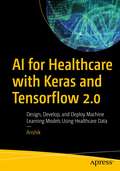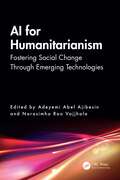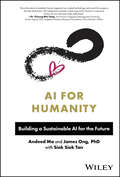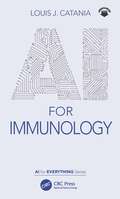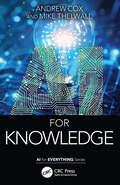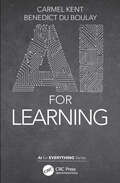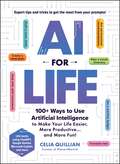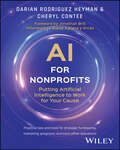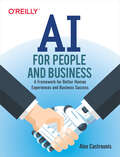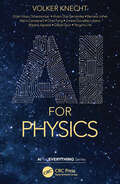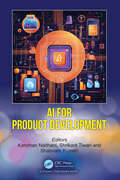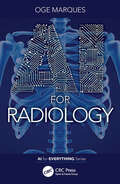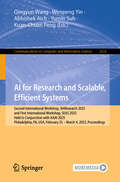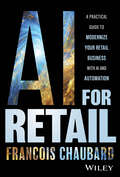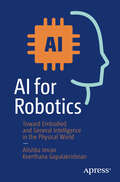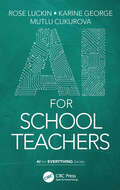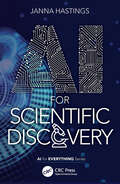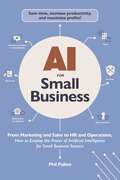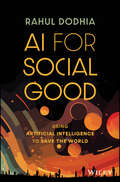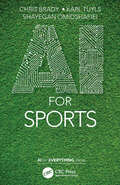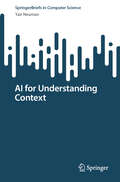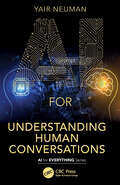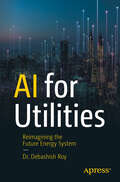- Table View
- List View
AI for Healthcare with Keras and Tensorflow 2.0: Design, Develop, and Deploy Machine Learning Models Using Healthcare Data
by AnshikLearn how AI impacts the healthcare ecosystem through real-life case studies with TensorFlow 2.0 and other machine learning (ML) libraries.This book begins by explaining the dynamics of the healthcare market, including the role of stakeholders such as healthcare professionals, patients, and payers. Then it moves into the case studies. The case studies start with EHR data and how you can account for sub-populations using a multi-task setup when you are working on any downstream task. You also will try to predict ICD-9 codes using the same data. You will study transformer models. And you will be exposed to the challenges of applying modern ML techniques to highly sensitive data in healthcare using federated learning. You will look at semi-supervised approaches that are used in a low training data setting, a case very often observed in specialized domains such as healthcare. You will be introduced to applications of advanced topics such as the graph convolutional network and how you can develop and optimize image analysis pipelines when using 2D and 3D medical images. The concluding section shows you how to build and design a closed-domain Q&A system with paraphrasing, re-ranking, and strong QnA setup. And, lastly, after discussing how web and server technologies have come to make scaling and deploying easy, an ML app is deployed for the world to see with Docker using Flask.By the end of this book, you will have a clear understanding of how the healthcare system works and how to apply ML and deep learning tools and techniques to the healthcare industry.What You Will LearnGet complete, clear, and comprehensive coverage of algorithms and techniques related to case studies Look at different problem areas within the healthcare industry and solve them in a code-first approachExplore and understand advanced topics such as multi-task learning, transformers, and graph convolutional networksUnderstand the industry and learn ML Who This Book Is ForData scientists and software developers interested in machine learning and its application in the healthcare industry
AI for Humanitarianism: Fostering Social Change Through Emerging Technologies
by Pooja Sharma Christian Kaunert Manju Khari Bhupinder Singh Narasimha Rao Vajjhala Anjana Sharma Adeyemi Abel Ajibesin Bashir Eseyin Abdullahi Taiwo Abiodun Jyoti Batra Murat Tahir Çaldağ Eriona Çela Neelatphal Chanda Philip Eappen Azubuike Erike Tarcízio Ferrão Ebru Gökalp Ishayu Gupta Radha Srinivasan Iyer Yusuf Kabir Kasum Munir Maharazu Kubau Devender Kumar Bashir Malgwi Yusuf Mshelia Yerzhan B. Mukashev Emeka Ogbuju Francisca Oladipo Edoghogho Olaye Bamidele Oluwade Rajasekhara Mouly Potluri Babatunde Dauda Raheem Md Mahfujur Rahman Santhosh Kumar Rajamani Selene Roldán Ruiz Arturo Roman Cesar Sanjuan Hussein Umar Samuel C. Avemaria Utulu Ayush Verma Abraham ZirraThis book explores the transformative potential of artificial intelligence (AI) in addressing critical humanitarian challenges. It examines AI’s role in enhancing emergency responses, poverty alleviation, and healthcare.Chapters authored by a diverse group of international contributors cover topics such as AI’s application in disease prediction, ethical AI practices, and innovative resource distribution. This book uniquely blends theoretical insights with practical case studies, providing a road map for leveraging AI in humanitarian efforts. Readers will benefit from detailed explorations of AI’s capabilities and challenges, gaining insights into how AI can drive social change and improve global humanitarian outcomes.Targeted at policymakers, researchers, practitioners, and anyone interested in the intersection of AI and humanitarianism, this book offers valuable perspectives on ensuring AI technologies are both advanced and ethically sound.
AI for Humanity: Building a Sustainable AI for the Future
by Andeed Ma James Ong Siok Siok TanCapture the value of cutting-edge AI while mitigating its most salient risks AI For Humanity: Building a Sustainable AI for the Future delivers an incisive and timely discussion of how to design, build, and implement cutting-edge AI in for-profit firms and other organizations in a responsible, sustainable, and ethical way. The book walks you through the three pillars of human-focused AI development—governance, technology, and commercialization—and dives deep into each one, showing you how to create AI products and services that better humanity and advance universally held values. You'll find methodologies and frameworks that mitigate against some of the most profound and unsettling risks of unchecked artificial intelligence development, and roadmaps to help you avoid the numerous pitfalls and traps awaiting unsuspecting companies, managers, and executives. You'll also discover: Real-world case studies, from companies including SAP, Huawei, and Tencent, demonstrating the actual dilemmas and questions firms face when developing and implementing this extraordinary tech Actionable commitments you can make to help ensure you and your company avoid the ethical and reputational risks associated with AI Strategies for AI product and service development consistent with sustainable growth Perfect for managers, executives, directors, and other business leaders with a stake in responsible artificial intelligence design, development, and implementation, AI For Humanity will also interest regulators, academics, thought leaders, and policy makers doing their best to capture AI's substantial potential value while mitigating its most serious risks.
AI for Immunology (AI for Everything)
by Louis J. CataniaThe bioscience of immunology has given us a better understanding of human health and disease. Artificial intelligence (AI) has elevated that understanding and its applications in immunology to new levels. Together, AI for immunology is an advancing horizon in health care, disease diagnosis, and prevention. From the simple cold to the most advanced autoimmune disorders and now pandemics, AI for immunology is unlocking the causes and cures. Key features: A highly accessible and wide-ranging short introduction to AI for immunology Includes a chapter on COVID-19 and pandemics Includes scientific and clinical considerations, as well as immune and autoimmune diseases
AI for Knowledge (AI for Everything)
by Mike Thelwall Andrew CoxAI for Knowledge explores the question of whether artificial intelligence (AI) is transforming knowledge access and creation for the good. AI is accelerating our access to knowledge through search, recommendation, summarisation, translation and a proliferating range of tools with AI built in. Generative AI is further changing how we use and create information at home and in the workplace. Yet AI also has a dark side with hallucination, bias and lack of explainability, as well as potential for harmful impacts on social equity and the environment.The book investigates how AI will impact everyday knowledge discovery, understanding and creation. It considers both the positive benefits and the many informational and ethical challenges, including the impact on our wider information culture. It then weighs up the impact on scholarship, in science, social science and the humanities and including the processes of scholarly communication. It explains the role of libraries and archives and how they could be enhanced using AI. It concludes by showing how governments can regulate AI to ensure social benefit and outlines what we as individuals need to know about AI.The book helps the reader see through some of the AI hype to understand much more clearly what are the issues around the impact of AI on knowledge access and creation, including the implications for environmental sustainability and the power of Big Tech. What emerges is a nuanced picture of potential benefit and risk, especially when we consider the experiences of those with less privileged access to the digital, particularly those outside the Global North.
AI for Learning (AI for Everything)
by Carmel Kent Benedict du BoulayWhat is artificial intelligence (AI)? How can AI help a learner, a teacher or a system designer? What are the positive impacts of AI on human learning? AI for Learning examines how artificial intelligence can, and should, positively impact human learning, whether it be in formal or informal educational and training contexts. The notion of ‘can’ is bound up with ongoing technological developments. The notion of ‘should’ is bound up with an ethical stance that recognises the complementary capabilities of human and artificial intelligence, as well as the objectives of doing good, not doing harm, increasing justice and maintaining fairness. The book considers the different supporting roles that can help a learner – from AI as a tutor and learning aid to AI as a classroom moderator, among others – and examines both the opportunities and risks associated with each.
AI for Life: 100+ Ways to Use Artificial Intelligence to Make Your Life Easier, More Productive…and More Fun!
by Celia QuillianDemystify the world of artificial intelligence with this groundbreaking guide featuring over 100 innovative ways to incorporate AI into your daily life.Every day, it seems like there&’s a new AI tool on the market and a new, complicated way to use it. But what if you could use AI to make your life easier without the complications? In AI for Life, AI expert and creator of @SmartWorkAI offers over 100 ideas and ready-to-use prompts to get AI beginners started using the technology to actually improve their lives. Beginning with a primer on the basics—including an overview of the popular and free AI tools—you will learn expert-tested tips and tricks to get the most out of your AI use, such as layering prompts to dive deeper into an initial response or asking for the output in different formats. Packed with practical how-to information, AI for Life is the must-have guide for using generative AI to make life easier, more productive, more organized, and more fun!
AI for Nonprofits: Putting Artificial Intelligence to Work for Your Cause
by Darian Rodriguez Heyman Cheryl ConteeA collection of actionable AI tools you can apply immediately to help your nonprofit drive social impact and change In AI for Nonprofits: Putting Artificial Intelligence to Work for Your Cause, a team of leading nonprofit experts and social entrepreneurs delivers a startlingly insightful, strategic “how-to guide” for nonprofit and foundation leaders, board members, and volunteers, as well as higher education professionals and social entrepreneurs looking to deploy and integrate artificial intelligence tailored to their organization's mission and needs. It's the leading reference guide for people who are entirely new to AI, as well as tech-savvy veterans with a deep understanding of artificial intelligence looking for proven, hands-on techniques they can apply immediately to transform their nonprofits. Each chapter is based on interviews conducted with 57 of the nonprofit industry's most innovative and reputed voices. Together, they provide the latest strategies and tactics for nonprofit generative AI and predictive analytics applications, skills and competencies needed to effectively use this new technology, tips, tools, best practices, resource reviews, and the most common pitfalls to avoid. AI for Nonprofits walks you through exactly how to strategically customize artificial intelligence to improve your fundraising and resource development efforts, marketing and community engagement, program delivery, and back-office operations. From human resources management to program strategy, social listening, and donor research, the book provides the on-the-ground techniques you need to deploy to transform your nonprofit's operations. Inside the book: Step-by-step frameworks and actionable roadmaps to help you implement AI for content creation, donor engagement, and developing personalized messages at scale How to protect your donors' privacy and data with policies and practices that comply with rapidly shifting legal and regulatory landscapes Cutting-edge research and practical case studies drawn from real-world situations that illustrate concrete AI applications Access to 100+ tools, platforms, and providers focused on helping nonprofits optimize their use of AI AI for Nonprofits explains how to supercharge your organization's fundraising pipeline, marketing and community engagement, program delivery, back-office operations, and governance policies. It's perfect for nonprofit executives, managers, professionals, and leaders, AI for Nonprofits will also earn a place in the libraries of anyone with an interest in using AI to power social impact and change.
AI for Peace (AI for Everything)
by Paige Arthur Branka PanicThe role of artificial intelligence in war is widely recognized, but is there also a role for AI in fostering peace and preventing conflict? AI for Peace provides a new perspective on AI as a potential force for good in conflict-affected countries through its uses for early warning, combating hate speech, human rights investigations, and analyzing the effects of climate change on conflict. This book acts as an essential primer for introducing people working on peacebuilding and conflict prevention to the latest advancements in emerging AI technologies and will act as guide for ethical future practice. This book also aims to inspire data scientists to engage in the peacebuilding and prevention fields and to better understand the challenges of applying data science in conflict and fragile settings.
AI for People and Business: A Framework for Better Human Experiences and Business Success
by Alex CastrounisIf you're an executive, manager, or anyone interested in leveraging AI within your organization, this is your guide. You'll understand exactly what AI is, learn how to identify AI opportunities, and develop and execute a successful AI vision and strategy. Alex Castrounis,founder and CEO of Why of AI, Northwestern University Adjunct, advisor, and former IndyCar engineer and data scientist, examines the value of AI and shows you how to develop an AI vision and strategy that benefits both people and business.AI is exciting, powerful, and game changing--but too many AI initiatives end in failure. With this book, you'll explore the risks, considerations, trade-offs, and constraints for pursuing an AI initiative. You'll learn how to create better human experiences and greater business success through winning AI solutions and human-centered products.Use the book's AIPB Framework to conduct end-to-end, goal-driven innovation and value creation with AIDefine a goal-aligned AI vision and strategy for stakeholders, including businesses, customers, and usersLeverage AI successfully by focusing on concepts such as scientific innovation and AI readiness and maturityUnderstand the importance of executive leadership for pursuing AI initiatives"A must read for business executives and managers interested in learning about AI and unlocking its benefits. Alex Castrounis has simplified complex topics so that anyone can begin to leverage AI within their organization." - Dan Park, GM & Director, Uber"Alex Castrounis has been at the forefront of helping organizations understand the promise of AI and leverage its benefits, while avoiding the many pitfalls that can derail success. In this essential book, he shares his expertise with the rest of us." - Dean Wampler, Ph.D., VP, Fast Data Engineering at Lightbend
AI for People, Democratizing AI: Second EAI International Conference, CAIP 2023, Bologna, Italy, November 24-26, 2023, Proceedings (Lecture Notes of the Institute for Computer Sciences, Social Informatics and Telecommunications Engineering #591)
by Giovanni Sartor Marta Ziosi João Miguel Cunha Angelo Trotta Philipp WickeThis book constitutes the refereed post-conference proceedings of the Second EAI International Conference on AI for People, Democratizing AI, CAIP 2023, held in Bologna, Italy, during November 24-26, 2023. The 11 regular papers were carefully reviewed and selected from 27 submissions. The papers are organized in thematic sessions on ethical AI and innovation; democratization of AI and governance; AI in society and legal aspects; and data privacy and technology ethics.
AI for Physics (AI for Everything)
by Volker KnechtWritten in accessible language without mathematical formulas, this short book provides an overview of the wide and varied applications of artificial intelligence (AI) across the spectrum of physical sciences. Focusing in particular on AI's ability to extract patterns from data, known as machine learning (ML), the book includes a chapter on important machine learning algorithms and their respective applications in physics. It then explores the use of ML across a number of important sub-fields in more detail, ranging from particle, molecular and condensed matter physics, to astrophysics, cosmology and the theory of everything. The book covers such applications as the search for new particles and the detection of gravitational waves from the merging of black holes, and concludes by discussing what the future may hold.
AI for Product Development
by Shrikant Tiwari Kanchan Naithani Shabnam KumariAI for Product Development explores the transformative role of artificial intelligence in reshaping modern industries. This book offers a comprehensive guide, spanning the evolution of AI in product innovation to practical applications, such as clustering techniques, human-autonomous vehicle interactions, and personalized healthcare solutions. With contributions from leading researchers, it covers explainable AI, real-world case studies, and ethical considerations in intelligent systems. The chapters delve into cutting-edge topics such as YOLO model variants, AI-driven emotion detection, and strategies for overcoming AI implementation challenges. Designed for researchers, professionals, and students, it bridges theory and practice, emphasizing AI's profound impact on product development and beyond.
AI for Radiology (AI for Everything)
by Oge MarquesArtificial intelligence (AI) has revolutionized many areas of medicine and is increasingly being embraced. This book focuses on the integral role of AI in radiology, shedding light on how this technology can enhance patient care and streamline professional workflows. This book reviews, explains, and contextualizes some of the most current, practical, and relevant developments in artificial intelligence and deep learning in radiology and medical image analysis. AI for Radiology presents a balanced viewpoint of the impact of AI in these fields, underscoring that AI technologies are not intended to replace radiologists but rather to augment their capabilities, freeing professionals to focus on more complex cases. This book guides readers from the basic principles of AI to their practical applications in radiology, moving from the role of data in AI to the ethical and regulatory considerations of using AI in radiology and concluding with a selection of resources for further exploration. This book has been crafted with a diverse readership in mind. It is a valuable asset for medical professionals eager to stay up to date with AI developments, computer scientists curious about AI’s clinical applications, and anyone interested in the intersection of healthcare and technology.
AI for Research and Scalable, Efficient Systems: Second International Workshop, AI4Research 2025, and First International Workshop, SEAS 2025, Held in Conjunction with AAAI 2025, Philadelphia, PA, USA, February 25–March 4, 2025, Proceedings (Communications in Computer and Information Science #2533)
by Kuan-Chuan Peng Wenpeng Yin Qingyun Wang Abhishek Aich Yumin SuhThis book constitutes the proceedings of the Second International Workshop, AI4Research 2025, and First International Workshop, SEAS 2025, which were held in conjunction with AAAI 2025, Philadelphia, PA, USA, during February 25–March 4, 2025. AI4Research 2025 presented 8 full papers from 35 submissions. The papers covered diverse areas such as agent debate evaluation, taxonomy expansion, hypothesis generation, AI4Research benchmarks, caption generation, drug discovery, and financial auditing. SEAS 2025 accepted 7 full papers from 17 submissions. These papers explore the efficiency and scalability of AI models.
AI for Retail: A Practical Guide to Modernize Your Retail Business with AI and Automation
by Francois ChaubardThe coming of the AI revolution in brick-and-mortar retail In AI for Retail: A Practical Guide to Modernize Your Retail Business with AI and Automation, Francois Chaubard, AI researcher and retail technology CEO, delivers a practical guide for integrating AI into your brick-and-mortar retail business. In the book, you’ll learn how to make your business more efficient by automating inventory management, supply chain, front-end, merchandising, pricing, loss prevention, e-commerce processes, and more. The author takes you step by step from no AI Strategy at all to implementing a robust AI playbook that will permeate through your entire organization. In this book, you will learn: How AI works, including key terminology and fundamental AI applications in retail How AI can be applied to the major functions of retail with detailed P&L analysis of each application How to implement an AI strategy across your entire business to double or even triple Free Cash Flow AI for Retail is the comprehensive, hands-on blueprint for AI adoption that retail managers, executives, founders, entrepreneurs, board members, and other business leaders have been waiting for.
AI for Robotics: Toward Embodied and General Intelligence in the Physical World
by Alishba Imran Keerthana GopalakrishnanThis book approaches robotics from a deep learning perspective. Artificial intelligence (AI) has transformed many fields, including robotics. This book shows you how to reimagine decades-old robotics problems as AI problems and is a handbook for solving problems using modern techniques in an era of large foundation models. The book begins with an introduction to general-purpose robotics, how robots are modeled, and how physical intelligence relates to the movement of building artificial general intelligence, while giving you an overview of the current state of the field, its challenges, and where we are headed. The first half of this book delves into defining what the problems in robotics are, how to frame them as AI problems, and the details of how to solve them using modern AI techniques. First, we look at robot perception and sensing to understand how robots perceive their environment, and discuss convolutional networks and vision transformers to solve robotics problems such as segmentation, classification, and detection in two and three dimensions. The book then details how to apply large language and multimodal models for robotics, and how to adapt them to solve reasoning and robot control. Simulation, localization, and mapping and navigation are framed as deep learning problems and discussed with recent research. Lastly, the first part of this book discusses reinforcement learning and control and how robots learn via trial and error and self-play. The second part of this book is concerned with applications of robotics in specialized contexts. You will develop full stack knowledge by applying the techniques discussed in the first part to real-world use cases. Individual chapters discuss the details of building robots for self-driving, industrial manipulation, and humanoid robots. For each application, you will learn how to design these systems, the prevalent algorithms in research and industry, and how to assess trade-offs for performance and reliability. The book concludes with thoughts on operations, infrastructure, and safety for data-driven robotics, and outlooks for the future of robotics and machine learning. In summary, this book offers insights into cutting-edge machine learning techniques applied in robotics, along with the challenges encountered during their implementation and practical strategies for overcoming them. What You Will Learn Explore ML applications in robotics, covering perception, control, localization, planning, and end-to-end learning Delve into system design, and algorithmic and hardware considerations for building efficient ML-integrated robotics systems Discover robotics applications in self-driving, manufacturing, and humanoids and their practical implementations Understand how machine learning and robotics benefit current research and organizations Who This Book Is For Software and AI engineers eager to learn about robotics, seasoned robotics and mechanical engineers looking to stay at the cutting edge by integrating modern AI, and investors, executives or decision makers seeking insights into this dynamic field
AI for School Teachers (AI for Everything)
by Rose Luckin Mutlu Cukurova Karine GeorgeWhat is artificial intelligence? Can I realistically use it in my school? What’s best done by human intelligence vs. artificial intelligence, and how do I bring these strengths together? What would it look like for me, and my school, to be AI Ready? AI for School Teachers will help teachers and headteachers understand enough about AI to build a strategy for how it can be used in their school. Examining the needs of schools to ensure they are ready to leverage the power of AI and drawing examples from early years to high school students, this book outlines the educational implications and benefits that AI brings to school education in practical ways. It develops an understanding of what AI is and isn't and how we define and measure what we value and provides a framework which supports a step-by-step approach to developing an AI mindset, focusing on ways to improve educational opportunities for students with evidence-informed interventions.
AI for Scientific Discovery (AI for Everything)
by Janna HastingsAI for Scientific Discovery provides an accessible introduction to the wide-ranging applications of artificial intelligence (AI) technologies in scientific research and discovery across the full breadth of scientific disciplines. AI technologies support discovery science in multiple ways. They support literature management and synthesis, allowing the wealth of what has already been discovered and reported on to be integrated and easily accessed. They play a central role in data analysis and interpretation in the context of what is called ‘data science’. AI is also helping to combat the reproducibility crisis in scientific research by underpinning the discovery process with AI-enabled standards and pipelines and supporting the management of large-scale data and knowledge resources so that they can be shared and integrated and serve as a background ‘knowledge ecosystem’ into which new discoveries can be embedded. However, there are limitations to what AI can achieve and its outputs can be biased and confounded and thus should not be blindly trusted. The latest generation of hybrid and ‘human-in-the-loop’ AI technologies have as their objective a balance between human inputs and insights and the power of number-crunching and statistical inference at a massive scale that AI technologies are best at.
AI for Small Business: From Marketing and Sales to HR and Operations, How to Employ the Power of Artificial Intelligence for Small Business Success (AI Advantage)
by Phil PallenAn essential guide for small business owners and entrepreneurs looking to use artificial intelligence to automate tasks, improve customer service, make better decisions, grow their businesses faster, and stay ahead of the AI curve.ChatGPT, machine learning, automation, natural language processing. Every day, it seems like there is a new AI term to learn and a new promise of how it will improve your work. But with tons of conflicting information, small business owners are left wondering exactly how to leverage AI technology to grow and, more importantly, stay competitive with larger companies. Cutting through the buzzwords and media frenzy, AI for Small Business is the road map to take you from overwhelmed to empowered. Opening with simple explanations of AI basics and clarification of myths, you are empowered to assess your goals to create a comprehensive AI strategy for your business—including information on selecting tools, a timeline for implementation, and ideas for scaling systems. This essential guide then walks you through practical AI applications for each department, informing you how to use AI to automate tasks, make better decisions, and grow your business in all areas including: -Sales -Marketing -Social media and content creation -Customer service -Finance and accounting -Operations and logistics -Human resources and talent management -Data analysis and decision-making -Security and legal compliance -R&D and innovation Author Phil Pallen is a brand strategist who uses his AI expertise to help hundreds of businesses scale and grow profits. In AI for Small Business, case studies from Pallen&’s successful clients illustrate how real small business owners are applying AI technology in various ways. Plus, ready-to-try prompt sidebars and specific product recommendations allow you to start employing the power of AI in real time.
AI for Social Good: Using Artificial Intelligence to Save the World
by Rahul DodhiaUnderstand the real power of AI and and its ability to shape the future for the better. AI For Social Good: Using Artificial Intelligence to Save the World bridges the gap between the current state of reality and the incredible potential of AI to change the world. From humanitarian and environmental concerns to advances in art and science, every area of life stands poised to make a quantum leap into the future. The problem? Too few of us really understand how AI works and how to integrate it into our policies and projects. In this book, Rahul Dodhia, Deputy Director of Microsoft’s AI for Good Research Lab, offers a nontechnical exploration of artificial intelligence tools—how they’re built, what they can and can’t do, and the raw material that teaches them what they “know.” Readers will also find an inventory of common challenges they might face when integrating AI into their work. You'll also read more on: The potential for AI to solve longstanding issues and improve lives Learn how you can tap into the power of AI, regardless of the size of your organization Gain an understanding of how AI works and how to communicate with AI scientists to create new solutions Understand the real risks of implementing AI and how to avoid potential pitfalls Real-life examples and stories that demonstrate how teams of AI specialists, project managers, and subject matter experts can achieve remarkable products. Written for anyone who is curious about AI, and especially useful for policymakers, project managers, and leaders who work alongside AI, AI For Social Good provides discussions of how AI scientists create artificially intelligent systems, and how AI can be used ethically (or unethically) to transform society. You’ll also find a discussion of how governments can become more flexible, helping regulations keep up with the fast pace of change in technology.
AI for Sports (AI for Everything)
by Chris Brady Karl Tuyls Shayegan OmidshafieiIt seems that artificial intelligence (AI) is always just five years away, but it never arrives. Recently, however, developments have made the practical utility of game theory a genuine reality. Will sport provide the petri dish in which AI will prove itself? What do domain specialists like managers and coaches want to know that they can’t currently find out, and can AI provide the answer? What competitive advantages might AI provide for recruitment, performance and tactics, health and fitness, pedagogy, broadcasting, eSports, gambling and stadium design in the future? Written by leading experts in both sports management and AI, AI for Sports begins to answer these and many other questions on the future of AI for sports.
AI for Understanding Context (SpringerBriefs in Computer Science)
by Yair NeumanContext is necessary for understanding human behavior. However, so far, the concept of context has mostly been treated in a way that lacks any clear relevance for using, developing and engineering intelligent systems. In this book, the author explains the importance of context for understanding human behavior, presents a theory of context, and shows how AI, specifically Large Language Models such as GPT, can support our understanding of context when analyzing human behavior as expressed in texts ranging from conversations to short stories. Drawing on years of R&D and academic publications in top rated journals, the author provides the reader with a simple and deep understanding of context and its modeling for specific challenges, from identifying social norm violations to understanding conversations going awry and stories by great authors. The book may interest a wide variety of readers seeking to incorporate AI into their understanding of human behavior.
AI for Understanding Human Conversations (AI for Everything)
by Yair NeumanArtificial intelligence (AI) and specifically large language models (LLMs) revolutionize our lives with new technologies appearing at an unprecedented rate. These technologies can potentially change how we understand human conversations, from the dialogues of married couples to diplomatic conversations.This book explains how to use LLMs to analyze human conversations and how better LLMs can be developed by incorporating a deep theoretical understanding.Drawing on case studies from Pulp Fiction to diplomatic meetings, the book provides detailed, approachable, and theoretically grounded explanations of how LLMs can help us understand conversations.
AI for Utilities: Reimagining the Future Energy System
by Dr. Debashish RoyThis transformative book explores the power of artificial intelligence (AI) in revolutionizing the utilities industry. It covers crucial topics such as intelligent grids, decentralized energy resources, customer engagement, electric vehicle integration, and more, providing a comprehensive and practical guide to successfully navigate the energy transition.In today's world, the urgency of addressing climate change and transitioning to sustainable energy systems is undeniable. With approximately 60 percent of global greenhouse gas emissions attributed to the energy sector, utilities play a vital role in achieving sustainability goals. The traditional utility business model faces disruption from renewable energy, changing consumer expectations, and regulatory shifts. Embracing AI emerges as a key solution to optimize operations, enhance grid reliability, and meet evolving customer demands.Through compelling case studies and industry-specific use cases, you will discover how AI drives innovation, improves operational efficiency, and contributes to a greener and more sustainable world. As the demand for cleaner and more sustainable energy practices grows, this book demonstrates how AI can support utilities in meeting these demands, making them more resilient, agile, and customer-centric.Whether you're a seasoned industry expert or a curious student, this book equips you with the knowledge and insights to embrace sustainability, navigate the complex energy landscape, leverage AI to shape a positive future, and join the movement towards a greener world, empowered by AI's potential in the utilities industry.What You Will LearnUnderstand the challenges and opportunities for utilities in the context of climate change, energy poverty, and the evolving business landscapeDiscover how rapid transformation is needed in the utilities sector to overcome challenges and leverage opportunities for a sustainable futureGain insight into the role of technology, particularly artificial intelligence (AI), as a critical tool for utilities in their transformation journeyBe aware of how AI can be applied in building the future utility industry, including its potential impact on energy efficiency, intelligent energy ecosystems, community engagement, and new business modelsGain knowledge of the adoption of AI and machine learning technologies in the utility industry, including the current state, barriers, significant influencing factors, and an AI adoption maturity model for utilitiesRecognize the sustainability imperative for utilities and how AI can help in achieving sustainable energy practicesBecome familiar with the transformation of power generation, microgrids, intelligent transmission and distribution systems, utilities retail, mobility through electric vehicles, and the integration of distributed energy resources(DER) using AIGain insight into the potential of AI in addressing challenges and driving innovation in the energy ecosystem, such as optimizing power generation assets, enhancing grid intelligence, improving customer service, and enabling clean energy awareness in the metaverseWho This Book Is ForProfessionals and decision makers in the global utilities industry who want to leverage artificial intelligence (AI) technologies to transform their operations and address challenges and opportunities in the energy sector. This book may also appeal to researchers, academics, and students in the fields of energy engineering, environmental science, data analytics, and AI who want to gain a deeper understanding of AI in the utilities sector and its implications for sustainable energy systems.
